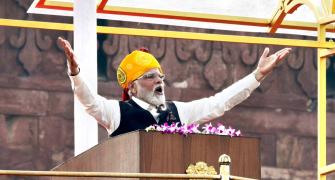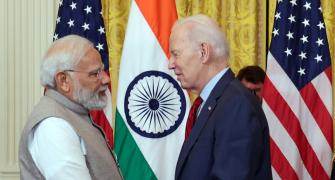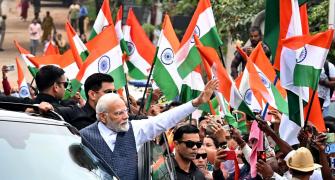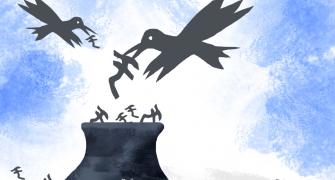A week before he hosts world leaders at the G20 summit, Prime Minister Narendra Modi has asserted that the 'Sabka Saath Sabka Vikas' model can be the guiding principle for the welfare of a world shifting from a 'GDP-centric approach' to a 'human-centric one'.

"Irrespective of the size of the GDP, every voice matters," Modi told PTI in an exclusive interview late last week at his Lok Kalyan Marg residence.
United States President Joe Biden, Japanese Prime Minister Fumio Kishida, British Prime Minister Rishi Sunak, Saudi Arabia's King Mohammed bin Salman and other leaders will gather at the newly-constructed Bharat Mandapam conference hall on September 9-10 for the pre-eminent annual meeting of developing and developed countries.
"Many positive impacts are coming out of India's G20 Presidency. Some of them are very close to my heart," Modi said in the 80-minute interview, focused on G20 and related issues, with three senior staff of PTI including Editor-in-Chief Vijay Joshi.
G20 accounts for 85 per cent of the global GDP, 75 per cent of international trade and 65 per cent of the world population. India took over the G-20's presidency from Indonesia last November, and will hand over to Brazil in December.
Modi said that while it is true G20 is an influential grouping in terms of its combined economic might, 'a GDP-centric view of the world is now changing to a human-centric one', and just as a new world order was seen after World War 2, a new world order is taking shape post-Covid.
"The shift to a human-centric approach has begun globally and we are playing the role of a catalyst. India's G20 Presidency has also sowed the seeds of confidence in the countries of the so-called Third World," he said.
"The Sabka Saath Sabka Vikas model that has shown the way in India can also be a guiding principle for the welfare of the world."
While the interview was meant to be focused on G20, Modi also spoke about India's economic progress, its growing stature on the world stage, cyber-security, debt trap, bio-fuel policy, United Nations reforms, climate change and his vision of what India will be like in 2047.
Corruption, casteism and communalism will have no place in national life by 2047 and the poor will comprehensively win the battle against poverty, Modi said, outlining his vision for the country for the next two decades.
"We have democracy, demography and diversity with us and now a fourth D is getting added to it development," he said.
The prime minister said before 2014, the country saw many governments that were unstable and, therefore, unable to get much done.
"But in the last few years, the people have given a decisive mandate, which has led to a stable government, predictable policies and clarity in the overall direction," Modi, who is seeking a third term as prime minister, said.
"By 2047, I am sure that our country will be among the developed countries.
"Our economy will be even more inclusive and innovative. Our poor people will comprehensively win the battle against poverty. Health, education and social sector outcomes will be among the best in the world.
"Corruption, casteism and communalism will have no place in our national life," he said.
He asserted that the quality of life of Indians would be at par with the best countries of the world and 'most importantly, we will achieve all of this while caring for both nature and culture'.
He also noted that the rapid and sustained progress made by India has evoked interest across the world.
"Many countries have been watching our growth story very closely and they are convinced that this progress is not an accident but is happening as a result of a clear, action-oriented roadmap of Reform, Perform, Transform'," he said.
Emphasising that the period till 2047 is a 'huge opportunity', he said Indians who are living in this era have a great chance to lay a foundation for growth that will be remembered for the next 1,000 years!
"The nation is also realising the enormity of this moment. This is why you see an unprecedented rise across multiple domains. We have a century of unicorns and are the third-largest startup hub.
"Our space sector's achievements are being celebrated the world over. In almost every global sports event, India is breaking all previous records," he said.
More universities are entering the top rankings of the world year after year, he said and added that with 'such momentum, I am positive that we will be in the top 3 economies in the near future'.
The PM strongly called for reform of the United Nations in line with the changing realities of the world and to ensure representation of voices that matter, saying that a mid-20th century approach cannot serve the world in the 21st century.
Modi said the G20 is one of the institutions that is being looked at with 'hope' by many countries as the world is looking for actions and outcomes, 'no matter where they come from'.
"Today's world is a multipolar world where institutions are extremely important for a rules-based order that is fair and sensitive to all concerns. However, institutions can retain relevance only when they change with the times," the prime minister said.
"A mid-20th century approach cannot serve the world in the 21st century. So, our international institutions need to recognise changing realities, expand their decision-making forums, relook at their priorities and ensure representation of voices that matter," he said.
"When this is not done on time, then smaller or regional forums begin to attain more importance," Modi said in the 80-minute interview.
"The G20 is certainly one of the institutions that is being looked at with hope by many countries. Because the world is looking for actions and outcomes, no matter where they come from."
The prime minister noted that India's Presidency of the G-20 has come at such a juncture.
"In this context, India's position within the global framework becomes especially pertinent. As a diverse nation, the Mother of Democracy, the home to one of the world's largest populations of youth, and the growth engine of the world, India has a lot to contribute to the shaping of the future of the world," he said.
"The G20 has provided a platform for India to further its human-centric vision and also collaboratively work towards innovative solutions to problems that are faced by humanity as a whole."
G20 was born at the end of the last century when the major economies of the world got together with a vision of a collective and coordinated response to economic crises. Its salience grew even more during the global economic crisis in the first decade of the 21st century.
But when the Covid pandemic struck, the world understood that in addition to the economic challenges, there were also other important and immediate challenges impacting humanity, Modi said.
By this time, the prime minister said, the world was already taking note of 'India's human-centric model of development' in economic growth, technological progress, institutional delivery and social infrastructure.
"There was greater awareness of these massive strides being taken by India. It was acknowledged that the country which used to be seen just as a large market had become a part of the solutions to the global challenges," he said.
"By the time India became the president of G20, our words and vision for the world were not being taken merely as ideas but as a roadmap for the future."
In a new dimension to the G20, its ministerial and other meetings were held not just in the capital New Delhi but in all parts of the country, including second and third-tier cities such as Indore and Varanasi. More than one lakh delegates met for some 200 sectoral meetings, many in tourist destinations such as Hampi, Kerala, Goa and Kashmir.
"They have been going to different regions, witnessing our demography, democracy and diversity. They are also seeing how a fourth D, development, has been empowering the people over the last decade. There is a growing understanding that many of the solutions that the world needs are already being successfully implemented in our country, with speed and scale," Modi said.
While answering a question about the global debt crisis -- which he noted is 'a matter of great concern, especially (for) developing countries' -- Modi took a dig at freebies given by some state governments in India, and stressed on the need for financial discipline.
"Populism may give political results in the short term but will extract a great social and economic price in the long term. Those who suffer the consequences the most are often the poorest and the most vulnerable," he said.
Modi also said that India backs inclusion of the African Union as a full member of the G20 as no plan for the future of the planet can be successful without the representation and recognition of all voices.









